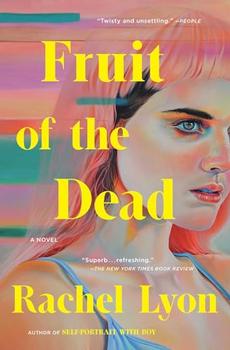Summary | Excerpt | Reading Guide | Reviews | Beyond the Book | Read-Alikes | Genres & Themes | Author Bio

A Novel
by Rachel LyonThis article relates to Fruit of the Dead
 Rachel Lyon's novel Fruit of the Dead is based on the story of Demeter and Persephone from Greek mythology. In the original story, Demeter, goddess of the harvest, is devastated when her daughter Persephone is kidnapped by Hades, god of the underworld, who intends to make her his wife. Demeter's grief is so great that it affects the growth of crops and plants in nature. She appeals to the god Zeus, who asks Hades to let Persephone go. Hades agrees to this on the condition that Persephone hasn't eaten any of the food he has given her, but Persephone has (wouldn't you know it) eaten seeds from a pomegranate. As a compromise, Zeus and Hades decide that she will stay in the underworld for one-third of the year, and that she can return to Earth for the remaining two-thirds. And so for the part of the year Persephone is gone, Demeter's sadness at her daughter's absence causes plants and crops to stop growing, while during the rest of the year, they flourish.
Rachel Lyon's novel Fruit of the Dead is based on the story of Demeter and Persephone from Greek mythology. In the original story, Demeter, goddess of the harvest, is devastated when her daughter Persephone is kidnapped by Hades, god of the underworld, who intends to make her his wife. Demeter's grief is so great that it affects the growth of crops and plants in nature. She appeals to the god Zeus, who asks Hades to let Persephone go. Hades agrees to this on the condition that Persephone hasn't eaten any of the food he has given her, but Persephone has (wouldn't you know it) eaten seeds from a pomegranate. As a compromise, Zeus and Hades decide that she will stay in the underworld for one-third of the year, and that she can return to Earth for the remaining two-thirds. And so for the part of the year Persephone is gone, Demeter's sadness at her daughter's absence causes plants and crops to stop growing, while during the rest of the year, they flourish.
The story is told in a 495-line poem by Homer, from which Lyon's novel pulls quotes (of the English translation from Hugh G. Evelyn-White) for the wonderfully dramatic titles of chapters that alternate between the points of view of her modern Demeter-Persephone pair: Emer, who works for an agricultural NGO, and Cory, a shiftless high-school grad. Cory shares her mother's interest in nature, but in her quest for pleasure and oblivion, she slips and falls into the clutches of a predator, a pharmaceutical CEO named Rolo, who serves as a stand-in for Hades. Choice examples of Emer's chapter names include "I Sped, Like a Wild-Bird, Over Firm Land and Yielding Sea" and "Disfigured by Grief Terrible and Savage, I Sat Near the Wayside Like an Ancient Woman," while Cory's perspective is preceded by gems such as "And She Yet Beheld Earth and Starry Heaven, and the Strong-Flowing Sea Where Fishes Shoal, and Still Hoped to See Her Mother."
Lyon drops numerous references to the original myth in her novel, like a diner named Pluto — downgraded dwarf planet and Hades' Roman counterpart. Cory is lured into Rolo's grasp and held in his power by a drug his company manufactures in the form of a ruby-red pill called Granadone. Rolo even uses it in a cocktail dubbed Fruit of the Dead that nods to Persephone's delicious downfall: "Vodka, soda, bitters, a splash of pomegranate juice, a slice of lime. Tasty—kind of plummy—and so potent you felt like you'd transcended this earthly sphere."
Lyon's retelling highlights a balance between death and life, showing both the self-destruction and strange wisdom that can emerge in altered and slowed-down states, possibly suggesting that a kind of demise is necessary to add a sense of purpose to one's existence. But it also brings a modern and environmental sensibility to the myth, focusing on the way the earth's resources are captured and manipulated by controlling forces — big pharma, large-scale agriculture — who seek power equivalent to that of gods.
"The Rape of Proserpina" by Gian Lorenzo Bernini (circa 1621), photographed by Alvesgaspar CC BY-SA 4.0
Filed under Cultural Curiosities
![]() This "beyond the book article" relates to Fruit of the Dead. It originally ran in April 2024 and has been updated for the
February 2025 paperback edition.
Go to magazine.
This "beyond the book article" relates to Fruit of the Dead. It originally ran in April 2024 and has been updated for the
February 2025 paperback edition.
Go to magazine.
Your guide toexceptional books
BookBrowse seeks out and recommends the best in contemporary fiction and nonfiction—books that not only engage and entertain but also deepen our understanding of ourselves and the world around us.